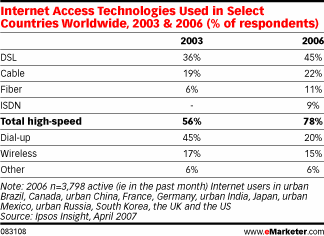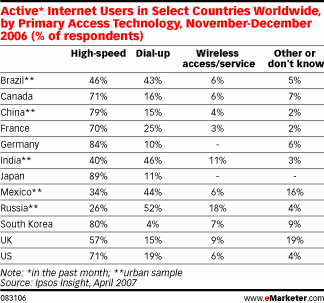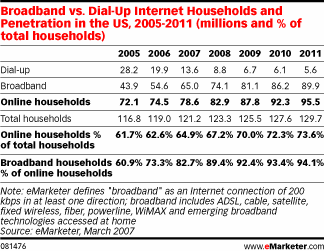
Brian Cruikshank of Ipsos Insights says that, "with fewer dial-up users to 'convert' in the future, and fewer net-new users to capture, broadband's mercurial growth may begin to plateau in many developed markets in the near future."
Ipsos predicts that notebook PC growth and wireless usage in underdeveloped markets will shift wired broadband growth to wireless connections.

Ipsos counts ISDN (usually 128kbps) as broadband, which explains why Germany, for example, is one of the leading countries on its list. eMarketer, like the FCC, defines broadband as 200kbps or more. By that definition, there is no question that South Korea has the highest broadband penetration of online households in the world, higher than 95%.
Apart from that methodological difference, Ipsos' figures are analogous to eMarketer's, considering sample size and countries covered.

"What we are seeing now is high-speed Internet users trading up to very high-speed Internet connections," says eMarketer senior analyst Ben Macklin.
In countries such as South Korea, Japan, France, China and the US, higher-speed connections using cable, ADSL2+ or optical fiber put 10Mbps to 100Mbps at users' disposal.
What are they doing with all that bandwidth?
Apart from generating and sharing their own multimedia content on sites such as YouTube and MySpace, broadband users are also using VoIP, and where available, IPTV services.
Mr. Macklin says the term "broadband" has a limited shelf-life.
"We are still at the stage of broadband development around the world where we continue to talk of things like bandwidth. In the future, however, bandwidth will flow like water from a tap, and talk will all be about the content and applications that use broadband, rather than the bandwidth itself."





